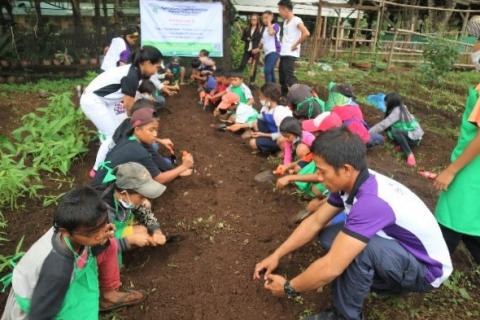Province of Bukidnon---With malnutrition and hunger considered as persistent problems that our country encounters, the Department of Education (DepEd) came up with the Gulayan sa Paaralan (GPP) Program which introduced to all public elementary and secondary schools nationwide the promotion of food security and economic stability. It is also in support to the hunger-mitigation initiatives of the government.
ATIng Gulayan is a Department of Agriculture (DA) project by which ATI with other attached DA agencies commit to put up household home gardens, shared gardens, and school gardens, and those in government and private offices, based on the receptiveness of partner institutions/LGUs. The project aims to promote food security in schools through self-help food production activities and values among the learners, and express appreciation for agriculture as a life support system.
For school garden, they must have plot gardens and other available space to set-up gardens vertically. The ATI will provide the initial inputs like seeds, organic fertilizers and will also provide seminars/trainings. The school garden will serve not only as a venue to grow and produce vegetables, but also for the students to have real appreciation for agriculture by being in the field and “dirtying their hands” while appreciating the food production system.
During the program launching, Agriculturist Cristine A. Galupo presented the training overview of the project and she reiterated that the program will end on November 2019. The participants should be able to produce organically grown vegetables to be fed to the participants and malnourished children; for marketing wherein the income will be used to buy another sets of garden inputs; and to be shown during the joint field day and graduation to encourage more youths and families to grow their own food. Ms. Galupo also reviewed the Extension Service Agreement were the School Principal, School Coordinator of Gulayan sa Paaralan, student-participants, and parents agreed.
On the other hand, one of the 4-H club major thrusts is to reintroduce agriculture in basic education. This means that 4-H Clubs should be organized in schools. This way, activities and programs should be focused and sustained, leading to sustainable development in food security, economic stability and general appreciation of agriculture as a life support system.
The ATI-RTC X in close collaboration with DA-RFO X provided training starter kits like vegetable seeds (pinakbet), garden tools (hand trowel, bolo, sprinkler, hand fork), polyethylene bags, polyethylene pots, nylon as trellis, Personal Protective Equipment (PPE), vermicast, Nature Farming Technology System (NFTS) IEC materials and concoctions (FFJ, FPJ, IMO, OHN, NIA, FAA, CaPhos), and Carbonized Rice Hull (CRH).
The participants learned about vegetable production (from seed to seed) and vermi composting where they actively participated. The Resource Persons are 4-H Club members which are engaged in farming and trained by the ATI. Furthermore, through the break-out session and simultaneous exchange all participants were able to produce CRH and NFTS concoctions. There were 30 participants per school trained consisting of students/pupils, parents, Gulayan sa Paaralan coordinator, and some staff from Barangay Council.
The training and launching transpired in two separate events at Base Camp Elementary School, Base Camp, Maramag, Bukidnon and Iba Integrated School, Iba, Cabanglasan, Bukidnon on July 15-16, 2019 and July 17-18, 2019 respectively. (with reports from Cristine A. Galupo, Agriculturist-II)

